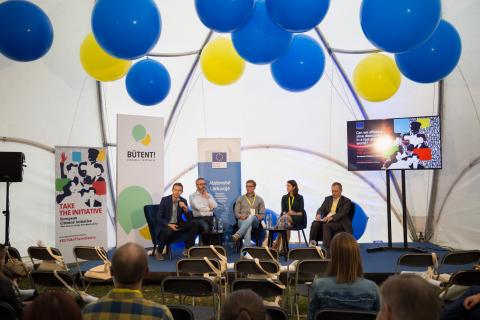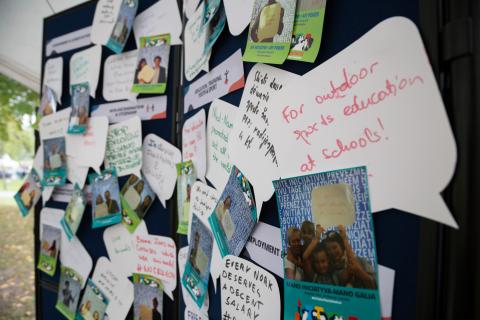
By Yana Pargova, Campaign Manager @ EUTakeTheInitiative, GOPA Com.
The European Citizens’ Initiative Roadshow set up its tent for two days at the open-air discussion festival Butent!, which took place in Birštonas, Lithuania, on 7 - 8 September 2018. Inspired by the democracy festivals in Scandinavia and the Baltics, Butent! celebrated its second edition with more than 90 discussions, 200 speakers and 6 000 festivalgoers. Citizens, businesses, academics, politicians and NGOs came together to promote a culture of discussion and listening, tolerance and civic engagement.
In Lithuanian, the name of the festival means ‘makes sense’ – or the moment where different citizens unite around an idea and agree on a plan to make it happen. Nothing could better reflect what the European Citizens’ Initiative is all about and it made absolute sense to be there. We organised a debate on how to make citizen-powered democracy work in a fast-moving, high-tech world. We also showcased our travelling photo booth, inviting people to speak out about their ideas and propel them on a trip across Europe to find like-minded citizens and partners.
The debate “Can we afford a slow democracy in a fast-paced world?” was moderated by Andrius Tapinas, journalist and founder of Laisves TV. He was joined on stage by Pascal Herry, team leader of the European Citizens’ Initiative at the European Commission; Tomas Jakutavičius, chairman of the Youth Council at the Lithuanian Industry Trade Unions‘ Federation; Edmundas Greimas, director of Lietuvo Gamtos Fondas, and Simona Pronckuté, board member at the European Citizens’ Initiative Campaign. The audience became an active participant by guiding the debate with answers to a quiz, polls and questions to the speakers, all powered by the interaction tool Slido.
Is ‘slow’ good for democracy?
Andrius Tapinas kicked off the debate with a discussion on the word “slow” and its positive or negative connotations in relation to democracy.
Edmundas Greimas compared democracy to a painting and citizens to artists – while you have the main principles (free speech, elections), you have to work on them meticulously.
“We need time for the creation of true democracy,” he said, adding that “democracy must be a true art coming from your heart, from your emotions; you have to create it yourself.”
Tomas Jakutavičius supported this view of citizens creating a slow, continuously developing and improving democracy, saying “We are all together in slow democracy; we are all slow democracy leaders.”
Pascal Herry also saw positivity in the word “slow”. He noted that the EU decision-making process is still perceived as being rather slow. However, he added, it is impossible to make democratic decisions if you do not provide opportunities for different groups in society and all citizens to express and represent their interests. Taking into account the points of view of all 28 Member States and 500 million citizens takes time, but time also means quality, he said.
Concretely, he focused on the changes the European Commission is trying to implement in order to improve the European Citizens’ Initiative, in particular the revision of the instrument to make it less complex and more democratic, the collaboration and knowledge-sharing forum and the online system for collecting signatures.
In contrast, Simona Pronckuté highlighted the need for fast solutions and fast tools in order to keep people motivated and to show them the results of their citizen-powered democracy efforts. At the same time, she acknowledged that some tools – such as the petitions to the European Parliament – are fast and easy to submit but usually address small, local problems while others – such as the European Citizens’ Initiative – aim to bring about EU level change and therefore require collaboration and more time.
The speakers went on to compare the attitude towards democracy in the old Member States with that in the new ones – namely, the Baltic countries and the Balkans. Specifically, they said that when the newer Member States joined the EU they aspired to reach the high living standards found in France or Germany, for example. That, they said, is why new Europe likes fast democracy better – they have had their democracies for a much shorter time and believe that, if they are not fast enough, they won’t be able to catch up.
Is fast-paced technology a threat to democracy?
“When you talk about a digital revolution, it’s the kind of revolution nobody asked for” – with these words, Mr Tapinas brilliantly opened the second topic of discussion asking if technology is perceived as a threat or as an opportunity.
The discussion touched upon:
- how technology poses a hacking threat to IT systems, as well as elections, which is why so many countries are afraid to introduce digital polling;
- how there is so much data available that we have reached a state where we are overloaded and slowed down by it.
“Excess of data slows don the decision-making process,” said Mr Greimas. These contemporary problems are something that we do not have ready answers and solutions for, but they will be slowly overcome with time, he added. The important message is that “we need to use technologies”.
Citizen-powered initiatives on a local, national and European level
A quick audience poll on the question “Have any of you participated in a citizen-powered initiative, on a local, national or European level?” showed a balanced result with 48 % answering yes and 52 % answering no. Mr Tapinas pointed out that there can be active and passive participation, and that we can be an active part of civil society without being fully aware of it.
Mr Herry referred to the reform of European regional policy about 30 years ago, which introduced the concept of partnership between local and European levels. He pointed out that Lithuania was making very good use of this and that there were several visible examples in Birstonas, such as rejuvenation projects or cross-border cooperation projects with Poland.
“Most of the projects set up here in Lithuania with the EU structural funds are participatory,” he said. “They are based on local projects with a European flavour.”
The speakers went on to share examples of participatory democracy tools and initiatives on local, national and European levels that they had worked on and supported.
Mr Jakutavičius talked about two local Lithuanian initiatives. One centred around a few children in a small Lithuanian city who wanted their skate park to be renovated as it was in very bad condition. They simply went to their mayor who agreed to repair it.
“It doesn’t matter if you are old or young, your voice can be heard,” he said. “You need to talk.”
Another example he shared was about an initiative promoting the cleaning up of forests.
“We wanted to enjoy a relaxing, pleasant run in the forest, so we decided to clean it,” he said. “We encouraged joggers to take a bag with them every time they went running and pick up the garbage. The initiative went on to achieve a great success.”
Mr Greimas shared his experience from the nature conservation sector, again addressing forests. One particular problem he and others were trying to resolve was the cutting down of forests in summer as this has a detrimental effect on the forest environment. They could only achieve a partial win – the cutting of forests in summer is now forbidden in protected areas.
“This goes to show that even if you don’t fully achieve what you set out to do, your actions in speaking up can have a positive effect,” he said.
He highlighted that it is important to act – “when you see a problem, write to the municipality. Then perhaps more people will notice the problem and you together can write a letter to the president. This is how small problems become larger concerns.”
Mr Pronckuté took the discussion to the European level and spoke in favour of the Swiss idea for EU referendums – a tool that currently doesn’t exist in practice in the Union. She also shared her opinion on the European Citizens’ Initiative explaining that there have been over 60 registered initiatives but only four successful ones and none have led to legislative change.
“As a problem, we see that the European Citizens’ Initiative is too complex and not very user-friendly,” she said. “For instance, the data requirements – the data requested is too much and therefore prevents people from joining. It is important to have effective tools that can make citizens feel that they can affect EU policy.”
However, she went on to highlight the positive effects of a citizens’ initiative even if it does not lead to legislative proposals, taking the initiative “Stop Vivisection”, which aimed to stop animal testing, as an example. Despite not leading to a legislative proposal, the campaign raised awareness of the issue, created a cross-country network and mobilized people. It strengthened civil society on an EU level overall.
“Maybe we didn’t win the war, but we won the battle”, she said.
Mr Jakutavičius, from the Lithuanian Industry Trade Unions‘ Federation, talked about his organisation’s direct experience with coordinating the European citizens’ initiative “Right2Water”. “We never think about this – it sounds like a birth right, but the reality is not all EU citizens have access to clean drinking water and sanitation,” he said. “We needed more than 8 000 signatures in Lithuania in order to reach the threshold, and we collected 20 000.”
Mr Herry summed up all the different initiatives on an EU level that promote citizen participation and active citizenship. In particular, he highlighted the Commission’s Better Regulation agenda in the context of which approximately 100 consultations are organised every year. He encouraged the audience to check the ‘Have your say’ website and register so that they receive notifications every time a new consultation is launched.
“In democracy, we have one essential component – the citizens, and the enthusiasm coming from the society and this should be the driving force of democracy’, concluded Ms Pronckuté.




Leave a comment
To be able to add comments, you need to authenticate or register.